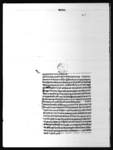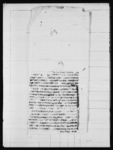A rukkā of the king forbidding abuse of porters and directing hulākī porters to carry the loads only for state purposes (VS 1905)
ID: DNA_0016_0023
Edited and
translated by Manik Bajracharya
in collaboration with
Pabitra Bajracharya
Created: 2019-05-20;
Last modified: 2019-11-05
For the metadata of the document, click here
The accompanying edition, translation/synopsis and/or commentary are available under the terms of the Creative Commons Attribution-ShareAlike 4.0 International License
Abstract
This rukkā of the king directs hulākī porters all over the country to carry only the ammunition, cash or money bags belonging to the army. It also prohibits priests, officials, courtiers and so on from abusing the hulākīs by forcing them to carry their personal belongings for free.Diplomatic edition
[1r]
1श्रीदुर्गाज्यू\1श्रीगुरु1445[royal seal]1स्वस्तिश्रीमन्महाराजाधिराजकस्यरुक्का¯¯¯ ¯¯¯ ¯¯¯ ¯¯¯ ¯¯¯2आगेमेचिपश्चिम∙महाकालीपूर्वभरमुलुक्काअडाअडाका¯¯पुरोहितचौत
3रीयाजनरलकाजिकम्यांडरकर्णेलक्र्णेलसर्दारकपतानसुव्वाकुंमेदानसु
4वेदारकंपुकाजाचकिजिल्लादारठेकदारद्वार्याथरिरकमिगैह्रप्रतिपुर्वपश्चि
5मकाभारादारहरुआँउंदाजाँदार∙रकमीजाचकिगैह्रआउंदाजाँदासदरवा
6टगल्लिगल्लिमावेगारिपक्रि∙भारिवोकाउंदा∙सारादुञाँलाई∙साह्रैविजाईवि
7च्छतहुनजाँदोरहेछर∙सोकुराश्रीमद्राजकुमारकुमारात्मजश्रीप्राइममि
8निष्टरयानकम्यांडरइनचिफ्जनरलजङ्गवहादुरकुव़रराणाजीमार्फत
9हाम्राहजुरमाजाहेरभय़ोअवउप्रांतमेचीपश्चीममहाकालीपुर्वकाकागत्या
10हुलाकि∙थापल्याहुलाकिहरुलेलालमोहरवमोजीमहाम्राजंगीषजानारुपैया
11पैसातोडाकाभारिअघिदेषिचलीआय़ावमोजीमवोकनु¯¯¯ ¯¯¯ ¯¯¯ पुरोहीत
12जनरलकाजिकम्यांडरकर्णेलअरुभरभारादारगैह्रआउंदाजाँदाररक
13मिजाचकीजिल्लादारगैह्रकाभारिवेगारिमानवोकनु∙कंपुपल्टन्कंपनी
14गैह्रकाषेतकाकुलावादवि∙ग्रंदार∙भत्क्याविग्र्याकासागुवनाउंदाउसैठाऊ
15कागाउघरकागुहारलेनपुग्दामुक्त्यारकादस्षतवमोजीमझारागुहा
16रगरिवादकुलोसागुवनाउन्याकामगर्नुयेतिवाहेकअरुभरभारादा
17रजाचकिरकमीजिल्लादारगैह्र्कसैलेपनीज्यालामजुरिनदीउसैवे
18गारिमाभारिनवोकाउनुहाम्रासदरवाटपनीतीनसहरगाउभरअम्वल
19माविनामजुरिनदीकसैलेवेगारिपक्रीभारिनवोकाउनुभंन्यावन्देजव़ा
20धिव़क्त्यौंजस्लेयोवंन्देजनाघिज्यालामजुरिनदीवेगारिमाभारिवोका
21उलाउस्लाईभारिदंडसासनाहोलाईतिसंम्वत्१९०५सालमितिपौ
22षवदि५रोज६शुभ्मं¯¯¯ ¯¯¯ ¯¯¯ ¯¯¯ ¯¯¯ ¯¯¯ ¯¯¯ ¯¯¯
[1v]
1मार्फत्वंवाहादुरकव़रराणाजी1मार्फत्जङ्गवहादुरकव़रराणाजीTranslation
[1r]
Glorious Durgā
Venerable Guru1
4452
[Royal seal]
Hail! [This is] an executive order (rukkā) of the venerable supreme king of great kings.
Āge: To [Venerable Guru]3 , priests, cautarīyās, generals, kājīs, commanders, colonels, saradāras, captains, subbās, kumedānas, subedāras, inspectors (jācakī) of the kaṃpus, jillādāras4 , ṭhekadāras, dvāryās, tharis, rakamīs etc. of various offices (aḍḍā) within the entire territory west of the Mechī and east of the Mahākālī.
It seems that when bhārādāras, rakamīs, jā̃cakīs and so on from the east and the west travel back and forth, they seize begārī [labourers] and make them carry loads from headquarters to different [village] quarters, which is a matter of great pain and unease to all subjects. We have been informed of this by the venerable prince and son of a prince, Prime Minister and Commander-in-Chief General Jaṅga Bahādura Kũvara Rāṇā.
From now on the kāgatyā hulākīs and thāpalyā hulākīs from west of the Mechī and east of the Mahākālī shall carry (only) loads containing military materials (khajānā), cash or money bags (toḍā) for our army in accordance with a lālamohara as has been done since earlier times. [Hulākīs] shall not carry loads [as] begārīs for [the Venerable Guru]5 , priests, generals, kājīs, commanders, colonels and other bhārādāras etc. when coming and going, or for rakamīs, jācakīs, jilādāras and so on. When irrigation channels[or] embankments in fields belonging to kampus, palṭanas or kampanīs etc. are damaged, or when repairing the broken-down bridges (sāgu), and local assistance is insufficient, accomplish the task of repairing the embankments, irrigation channels and bridges by calling upon jhārā assistance in accordance with a letter (daskhata) from the mukhtyāra6 . Except in these cases, no other bhārādāras, jācakīs or jillādāras are to obligate someone to carry loads as a begāri without paying him wages. I have made the prohibition (bandeja) that nor shall anyone seize a begārī [labourer] and make him carry loads without payment from our headquarters (i.e., Kathmandu) to the three cities,7 , villages and the entire [capital] district. Whoever disobeys this prohibition and makes [the hulākīs] carry loads as begārīs without payment will be subject to heavy punishment.
Friday, the 5th of the dark fortnight of Pauṣa in the [Vikrama] era year 1905 (1848 CE). Auspiciousness.
[1v]
Through (mārphat) Baṃ Bāhādura Kũvara Rāṇā.
Through Jaṅga Bahādura Kũvara Rāṇā.
Commentary
This executive order of King Surendra Vikrama Śāha, addressed to priests, government officials and military personnel, outlaws the exploitation of hulāka porters for personal purposes. It reflects the central government's repetitive attempts to control the misuse of porters. A plethora of documents announcing similar regulations were issued to officials in different parts of the country.8 The present document bear witness the state's intention to use the hulāka system for strictly military purposes; having them work on outside obligatory (jhārā) projects now required a written sanction from the commander-in-chief himself (cf. RRC_0044_131-32 (RRS 7.6: 110)). It prevents in particular hulākīs from being used as begārī porters, that is, porters forced to carry loads for free
This document has been signed by Bam Bahādura Rāṇā and Jaṅga Bahādura Rāṇā on the back side as witnesses.
The hulāka mail system in Nepal proved to be highly efficient throughout the 18th and 19th centuries. Reformed by Bhīmasena Thāpā and later on by the Rāṇās, it provided a useful means of transporting military ammunition and government mail during the Gorkha expansion. As mentioned in the current document, the hulāka porters were of two kinds, namely kāgatyā- and thāpalyā-hulākīs. Kāgatyā (var. kāgate) hulākīs were assigned to transport mail, and thāpalyā (var. thāple)-hulākīs to transport goods. Both were provided with rakamī land for their services (cf. MA-KM 1854 2.11).
The hulāka remained a service limited to the government’s own use until 1878, when it opened up to the general public through the formation of a postal service department, the Nepāla Hulāka Ghara.9


